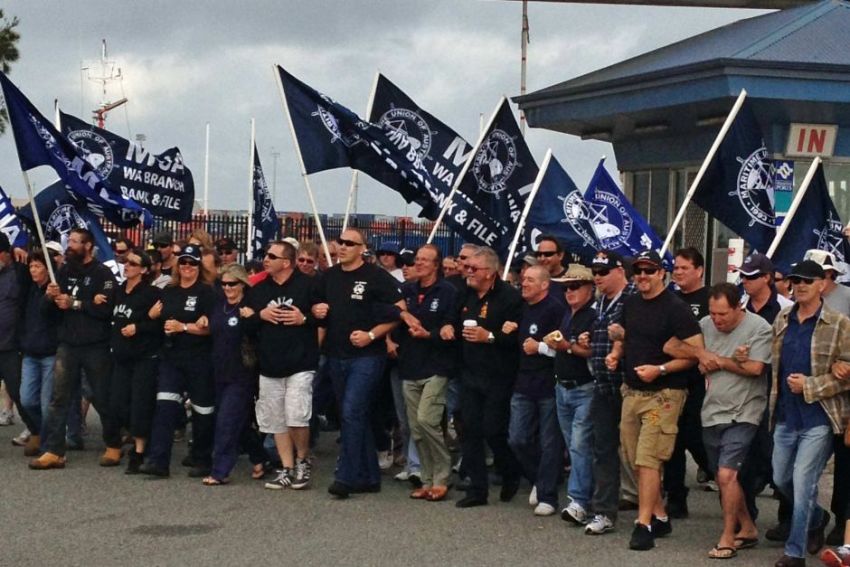
The Western Australia government wants to close the Fremantle container terminal and build a new one at Kwinana, further south. The decision is fundamentally flawed on economic and environmental grounds.
As there is still plenty of capacity at Fremantle, why decommission it to build a new facility that is twice as large?
The Mark McGowan Labor government is basing its decision on its own Westport Taskforce, which examined the future of the port and associated land and transport questions.
The Westport process and the government decision assume that the volume of container traffic and per capita consumption of imported goods will increase nearly three-fold in just 50 years.
This is reckless stupidity.
If we let capitalism continue on its drive for endless growth we can be certain that all the thresholds for runaway climate change will have been crossed, triggering the collapse of the Earth’s life systems and human civilisation along with it.
We won’t need a port anywhere in this scenario.
It’s worth recalling the words of Greta Thunberg to the United Nations in 2019: “We are at the beginning of a mass extinction and all you can talk about is money and fairy tales of eternal economic growth. How dare you.”
Traditional state planning has assumed that if and when Fremantle Port reaches capacity an option would be to build a new facility in the Outer Harbor, to complement it.
However moving nearly all freight to the Outer Harbour would dramatically increase the size of a facility there, and with it the cost and environmental impacts.
Worryingly, the Westport Taskforce changed its assessment criteria midway through the process to specifically downgrade the environmental impacts a Kwinana terminal would have on Cockburn Sound.
Further, it excluded from its assessment the embedded energy and greenhouse gases associated with abandoning the existing asset.
The publically-owned Fremantle Port makes an above average return for the people of Western Australia.
But there’s every reason to fear that, a new Outer Harbour facility, if it goes ahead, would be built as a “public private partnership” — where a private investor underwrites a significant share of the construction cost in return for a long-term lease.
In effect, this is the privatisation of a public asset. It has already happened to ports in other states, notably the Port of Melbourne.
While Fremantle Port has plenty of capacity, the roads around it are becoming increasingly congested.
However, it is entirely false to conclude that because of the victorious community campaign to stop Roe 8 and the larger Perth Freight Link (PFL) project (pushed by the previous Liberal government) we now have to choose between either a new freeway cutting a swathe through our community or more industrial development in the Cockburn Sound.
There are underlying problems with our current freight distribution system — greenhouse gas emissions, diesel particulate pollution and the concentration of truck traffic. Simply relocating these impacts is not good enough.
Currently, containers on rail can only go to Forrestfield. A substantial increase in freight on rail can be achieved through the creation of multiple inter-modal terminals at which other freight functions can be co-located.
The government should restart work on the Kwinana intermodal terminal, which was dropped by the previous government when it embraced the PFL.
While new intermodal hubs and more freight on rail will not eliminate truck movements, they will reduce them and spread them more evenly across greater Perth.
Existing road infrastructure can also be used more rationally.
Two important measures are the elimination of unnecessary “empty running” of trucks to and from the port through a more efficient booking system and incentives for transport companies to move containers at times that do not clash with commuter peak hour.
Furthermore, the government should be actively encouraging the transition to electric trucks to reduce diesel particulate and noise pollution for residents who live near the routes to port.
Mostly lost in the debate about traffic congestion in and around Fremantle Port is the fact that it is not trucks but private cars that are the biggest contributor to the problem. Truck movements have remained stable, thanks to the modest increase in the use of rail and other efficiencies.
The number and length of the average car journey has increased more quickly than the population. The reasons for this are complex, but moving the port won’t do anything to change it.
Completely absent from the government are any proposals for significant new public transport infrastructure for anywhere south of the river and west of the Kwinana Freeway in the greater Fremantle-Cockburn-Melville region.
In 2014, Labor promised to extend the passenger rail from Thornlie to Cockburn all the way through to Fremantle as Stage 2 of Metronet. But, this promise has now disappeared.
Nor has Labor responded to a combined local government submission calling for rapid transit along South Street light between Fremantle and Murdoch.
This failure to invest in public transport threatens to create the traffic congestion that could be used by the Liberals to generate support for resuscitating Roe 8/PFL in some form.
Labor is currently spending close to $200 million a month on widening roads and extending freeways.
There may be a time when the Inner Harbour approaches capacity, but the Westport process fell short of the exhaustive benefit-cost ratio analysis that would be needed to determine the best response.
If one thing is clear, it is that multi-billion dollar infrastructure projects that would shape our city for decades to come should not be “fast-tracked”.
In the face of catastrophic climate change, the business-as-usual assumptions about endless growth and building freeways have to end.
There are cost effective sustainable transport solutions and they need to be deployed right now. Our fight to see these implemented goes hand-in-hand with our determination to stop the closure of Fremantle Port as a working harbour.
[Sam Wainwright is a founding member of Fremantle Road to Rail, a Fremantle city councillor and the Socialist Alliance candidate for the seat of Fremantle in the WA election.]